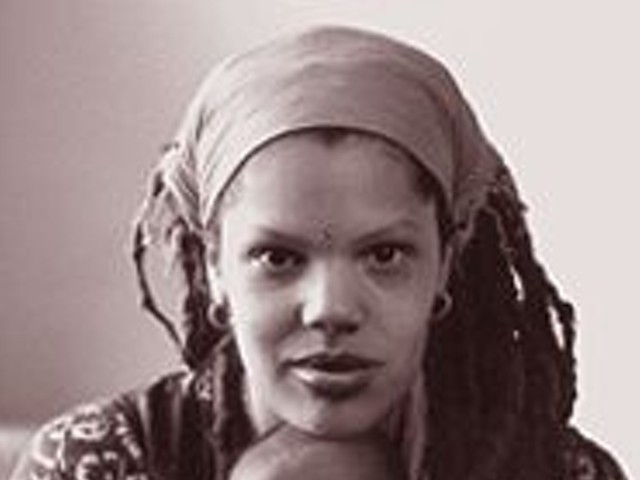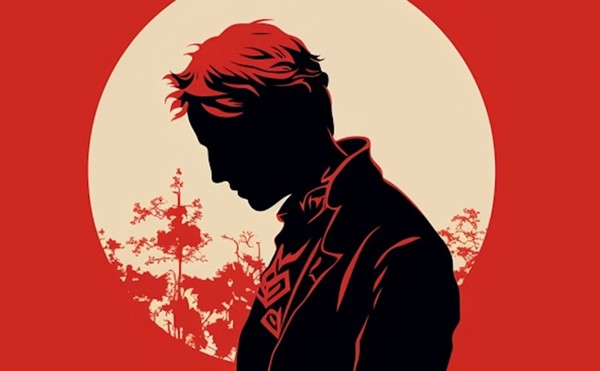What the deer at night consume
may be what we thought we needed
but can live without.
Try to forget your labor, the hours
you dug out the grove of young walnuts
to fill the neglected arbor with sun --
the vines like someone's handwriting
gone haywire with age,
wandering outside the lines.
Watching as you re-strung
what was left years ago to die,
I doubted anything could bloom,
but soon enough, tendrils, leaves,
then pea-sized grapes bubbled up,
chameleon-green clusters.
And as quickly as one can read
into the smallest gesture
the future, we conjured the mussel-blue
Concord -- then, just as fast,
because the past is nobody's fool,
the sweet skin of someone gone.
We each have our own aftertaste
(in the vines, the bees tracing figure eights),
what our years of plenty rub up:
a flurry of talcum, a scented wrist.
Then (worse?) -- remembering how to shine
the grape as if wiping a film of dust
from a frame -- a picture
of what was once. The vintage.
And those who tended us.
And the deer, what memories
lodged in their bodies,
what hunger, as they helped themselves
to our unripe fruit? Under the poor lantern
of the moon, stealthy ghosts,
they stripped the grapes
as we slept, dreaming as always
our versions of Pharaoh's dream.
We could grieve awake,
but given the liquid passage of the animal
through the dark, a current,
like it or not, we can't stop,
we go out after dinner to watch
the doe and her young feed on our apples.
Beautiful thieves, in the falling light
the color of grain
the wise store inside
after the growing season is over.
Allison Funk teaches at Southern Illinois University-Edwardsville and has two volumes of poetry -- Forms of Conversion and Living at the Epicenter -- to her credit. She lives in an 80-year-old Victorian house with her husband, George, and the younger of her two sons, Adam. With a white picket fence that is perpetually in need of a fresh coat of paint, a number of scraggly trees and a yard softened by gophers, it is a home suited at least to one idea of a poet's life. Funk's just returned from a trip to England and Scotland, so the yard and garden are more unkempt than usual, but in light of "The Deer," it's well worth taking a tour of the frail remnants of a former vineyard, where there are indeed a few "chameleon-green" grapes braving the thin light beneath the walnut trees. "It's very much a poem of this yard, this place," she says.
That yard is in clear view from her writing desk, her older son's former bedroom on the second floor. Her family has been in this house five years, and before Josh vacated the room, Funk composed at the kitchen table. She's fully indoctrinated in women's literary practice. "For years and years, the only time I could write was when the babies were sleeping," she recalls. For a poet who finds "quiet absolutely essential," she's learned over time to "find ways of shutting out" the noise of family, as, often, women writers must.
Funk belies the appearance of one who has raised two sons, suffered the heart-wrenchings of divorce and the nonsense of academia. For one whose poetry is often shadowed by loss, confronting the hard compromises the mature imagination must make to fashion a decent life, or, for that matter, one approaching the milestone of 50 years, Funk looks remarkably youthful, with a shoulder-length mane of light-brown, nearly blond hair framing a face that lightens with childlike inquisitiveness.
At her writing desk, she pulls out the notebook in which "The Deer" began. Besides the view from the window, Funk has a poster advertising a reading she once gave on one wall and, above her desk, an abstract painting by her older son, which includes text from one of her poems. Not far away is a shelf of books containing volumes of poetry that change according to the kind of inspirational support she feels she needs. Works by Anne Sexton, Jorie Graham and Robert Hass are among those now.
Funk began a poem with the working title "Gratitude" on Nov. 20, 1996 (she dates the drafts in her notebook, unless she forgets, which seems to happen as the intensity of the composition process increases). In the pages previous to "Gratitude" are the drafts of a sonnet sequence that, she says, she "had been working on for months and months." There are outlines of rhyming patterns and information about gothic cathedrals, "the ostensible subject matter" of the sequence, which, Funk says, is "really a poem about my father."
Then in her notebook she turns from England and Europe to the local. "I had been living in this place and had been seeing us in an ongoing battle to make things grow, and the deer's incursions. But as I lived with this situation for a while, what came to me -- what was the catalyst for the poem -- was not an idea but a beginning line or two."
Funk composes in pen, and her notebook is filled with thin blue script. What became the opening of "The Deer" approximates her first forays into the poem: "'What the deer, like the darkness, consume may be what we thought we wanted but can live without ....'" She avoids constructing these prose notes into lines of poetry: "I try to stay on the page as long as possible, because I want to feel my way. I want to make marginal notes. There'll be times when a particular line or phrase crystalizes, and I'll try to save that. But at this juncture, I don't know where I'm going. I'm sort of trying to find a narrative, or find my way through the scene. I just start talking" on the page.
She reads from the notebook: "'What we cultivated, cutting out the walnut trees, the poison ivy, to thread and stake the long-neglected vineyard, had not grown for years, now the green vines, leaf, pea-sized there, a cluster the size of your hand, dream of wine, the sweet-skin Concord.'"
At this point in her process, Funk doesn't want to consider meaning or theme "because that's too dangerous to be too conscious." For her, "very often the images will come from sounds. The bees that come into this -- where do they come from? Well, in fact there were bees buzzing around, but as I was reading this there were some 'eee' sounds that brought the bees into the world of the poem."
She reads from the notebook again: "I don't know what I'm doing here. 'Someone you love, loss like that.' I'm talking to myself now. Then I come back 'sour green hard troublesome seeds, like the fact of absence.' That never made it into the poem." Then a phrase appears, like a narrator announcing her presence: "'I am the daughter of gardeners and farmers.'"
Funk allows voices to emerge as she tries to discover the poem. She listens for stories: "When I discovered 'the Pharaoh's dream,' then I found another story. I feel like I need there to be at least two stories -- but not consciously; it's just that I keep writing until it kind of happens. It's no longer about myself."
In these swiftly written phrases that filled many pages of her notebook over a week's time, there are many passages that never became part of the final poem, characters that lingered for days but were excised. In the early drafts of "The Deer," Funk's grandmother is a central figure. "My grandmother grew Concord grapes," Funk explains. "All my memories of her wonderful arbors and grape jam -- so really this poem at a certain point early on was about that loss, and about that love. Looking back, I see how she began to vanish, and it became not specific. I realized this could have been a poem about my grandmother, and I decided not to do that. But all through here," she reads, "'my grandmother, my grandmother's arbor, youth, the arbor, my grandmother's talcum, her sweet sweat, her weed-stained hands, the musk of the dirt ... you must have your own.'"
Yet Funk remained open to broader possibilities than the specifics of family history in "The Deer": "I became aware at a certain point that the images that I was dealing with were feminine, but I also wanted the possibilities of sexuality, or a romantic relationship. In the process I was thinking, 'Oh dear, my grandmother would turn over in her grave,' but I decided I wanted it to be that. 'Scented wrist' suggests to me something very erotic." She laughs, "For my Presbyterian grandmother, I have to detach from her at that juncture."
The notes take an odd detour into a description of children playing jacks, "Then all of a sudden came 'Pharaoh's dream,'" says Funk, a bit astonished at the irrational path "The Deer" took. As it happened, she had been rereading a story from Genesis in which Joseph interprets the dream of Pharaoh as prophecy: In the time of plenty, the Egyptians need to store grain for the coming famine. "It just descended into the poem," Funk says.
She avoids moving from pen and ink to the keyboard because "I want to keep it slippery as long as possible, and I allow myself to write really terrible lines and to keep coming back and back. It's very, very bad to stop that process of the imagination too early. It takes a long time to get past the surface, to get down under it." She does allow herself the idea of an ending, which is more of a place to land, or "a resting place." In this case, she says, an image of the deer, "'their bodies bronzed in the dying light' -- that became the ending for a while, but I thought 'Oh God, it's like Dylan Thomas,'" Funk says. "I knew that was melodramatic and not going to work, but I needed to have a temporary place on which to feel the poem would eventually be over." She laughs at the sense of frustration: "And I wouldn't have to sit here any longer!"
After a few days the poem, still called "Gratitude," began to take shape. Funk began to construct line breaks and stanzas -- "Even-lined stanzas are too neat. There's a lack of balance" -- with three lines. "I want to make it more uncertain." She reads aloud from the notebook: "'What the deer at nightfall consume/may be what we thought/we needed but can live without.//Try to forget the labor, the hours/you dug out the grove of young walnuts/to let the sun in here' -- I'm still talking to myself -- 'the neglected arbor.' I don't have it here." She hunts for more details to describe the scene: "'Poison ivy, the woody remains, the pea-sized grapes, chameleon-green clusters/how quickly we read into it ... and is quickly lassoed'? Now, that may have gotten me to the figure eights (of the bees). I don't know."
In search of an ending, she returned to the idea of Pharaoh's dream, and words such as "storage" and "bounty" and "cold season" appeared. Reading her notes, Funk says, "I'm realizing this is where to go, but I haven't found the language yet." Characters emerged -- a couple holding hands; dialogue with stage directions. Funk laughs at these detours: "I'm trying to dramatize it in my own mind."
With any poem, she doesn't turn to the keyboard until "I really have a longing for something that seems concrete, that seems real." The title "The Deer" appeared on the typewritten drafts for the first time. Funk has found the simple, resonant phrase "after the growing season is over," broadening the poem at its conclusion. "The poem continued to instruct me," says Funk. "Most of my poems, I can't say that about. I continued to come back and try to understand what this poem was saying to me. I cared about it that much."
But the poem is still not finished after Funk prints pages and pages of drafts from the computer. Even after "The Deer" is published in the literary journal Shenandoah, she changes the second line of the first stanza, placing the line break at "needed" rather than "thought." "I really saw the important phrase was 'we thought we needed' and I wanted to keep those four words together. I have a feeling that maybe initially I was playing with the half-rhymes here -- 'night, thought, without' -- and maybe that, to some degree, brought about the initial line break. And then I wanted a couple of things, I think: I wanted it more subtle than that. I wanted to embed the thought. I came increasingly to understand what the poem was about even after it was finished, and I wanted to cluster 'what we thought we needed.' And for rhythmical reasons it worked much better also. So for reasons of honesty, or commitment to the idea ... I think it's more of a mature line break in the sense of it being wiser. Is that possible?"
Months, years later, she still questions the final version: Is "Under the poor lantern/of the moon" too decorative? "We have to continually call ourselves back to look more closely," she says, "to see more clearly, to deal less mercilessly with ourselves." And, ultimately, the work it takes to make a meaningful poem, like the work it takes to live a meaningful life, involves "staying in the dark long enough to see."





